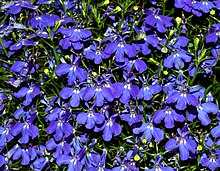Lobelia
| Lobelia | |
|---|---|
 |
|
| Lobelia erinus | |
| Scientific classification | |
| Kingdom: | Plantae |
| (unranked): | Angiosperms |
| (unranked): | Eudicots |
| (unranked): | Asterids |
| Order: | Asterales |
| Family: | Campanulaceae |
| Subfamily: | Lobelioideae |
| Genus: |
Lobelia L. |
| Type species | |
|
Lobelia cardinalis L. |
|
| Synonyms | |
|
|
Lobelia (/loʊˈbiːliə, lə-/) is a genus of flowering plants comprising 415 species, with a subcosmopolitan distribution primarily in tropical to warm temperate regions of the world, a few species extending into cooler temperate regions. They are known generally as lobelias.
The genus Lobelia comprises a substantial number of large and small annual, perennial and shrubby species, hardy and tender, from a variety of habitats, in a range of colours. Many species appear totally dissimilar from each other. However, all have simple, alternate leaves and two-lipped tubular flowers, each with five lobes. The upper two lobes may be erect while the lower three lobes may be fanned out. Flowering is often abundant and the flower colour intense, hence their popularity as ornamental garden subjects.
The genus is named after the Belgian botanist Matthias de Lobel (1538–1616). Some botanists place the genus and its relatives in the separate family Lobeliaceae, others as a subfamily Lobelioideae within the Campanulaceae. The Angiosperm Phylogeny Group did not make a firm decision on this, listing the genus under both families.
Lobelia is probably the base form from which many other lobelioid genera are derived; it is therefore highly paraphyletic and not a good genus in a cladistic sense. For example, the Hawaiian species (see Hawaiian lobelioids), currently classified in several genera, originated from a single introduction to a now-submerged Hawaiian Island 15 million years ago, probably from an Asian Lobelia in Lobelia subg. Tupa.
...
Wikipedia
